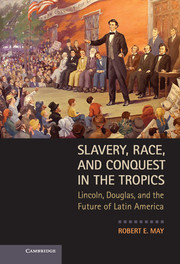Book contents
3 - Beyond Kansas
Published online by Cambridge University Press: 05 June 2014
Summary
Stephen Douglas was in the friendly surroundings of New York City when he issued his challenge. He was staying at the St. Nicholas Hotel in the strongly Democratic and relatively pro-South metropolis following the passage of his controversial Kansas-Nebraska bill in May 1854 and probably did not yet fully grasp that his legislation made him a pariah in much of the North. After all, his boosters in the city, who threw several events in his honor, seemed untroubled by the vehement objections raised in the northern press and pulpit and on the floors of Congress against his measure. One celebration began around 11:00 p.m. on June 3, when a large gathering congregated outside his hotel, continuing after midnight as a more-than-thirty-piece brass band turned up to celebrate him. As the crowd cried, “Douglas, Douglas,” the Little Giant strode to the balcony of the hotel and, after being introduced by a local Democratic leader, defended “the great principle of popular sovereignty” enshrined in his Kansas enactment. Then Douglas threw down the gauntlet. His critics, he warned, should back off in their vituperative attacks because his “Nebraska bill” was gaining popularity as people familiarized themselves with it. In fact, Americans would want the same principles applied in the future whenever “the question of the admission of any new State arises, whether it be Nebraska, Kansas, Oregon, Mexico, Cuba or the Sandwich Islands.”
Douglas’s prognostication, picked up by the press, hardly mollified his detractors. The New York Times assumed that the very territorial growth for popular sovereignty Douglas optimistically anticipated would make the “extension of Slavery over all the territory which the United States now possess, or may hereafter acquire” into the “great aim and object of the Democratic party.” Similarly, the antislavery Washington National Era thought Douglas’s remarks confirmation that the senator and his allies intended slavery’s extension into future territorial acquisitions and suggested that Douglas’s omission in his list of the Dominican Republic, a former Spanish colony on Haiti’s eastern boundary that took up roughly two-thirds of the island of Hispaniola both countries occupied, was probably unintended.
- Type
- Chapter
- Information
- Slavery, Race, and Conquest in the TropicsLincoln, Douglas, and the Future of Latin America, pp. 104 - 153Publisher: Cambridge University PressPrint publication year: 2013



